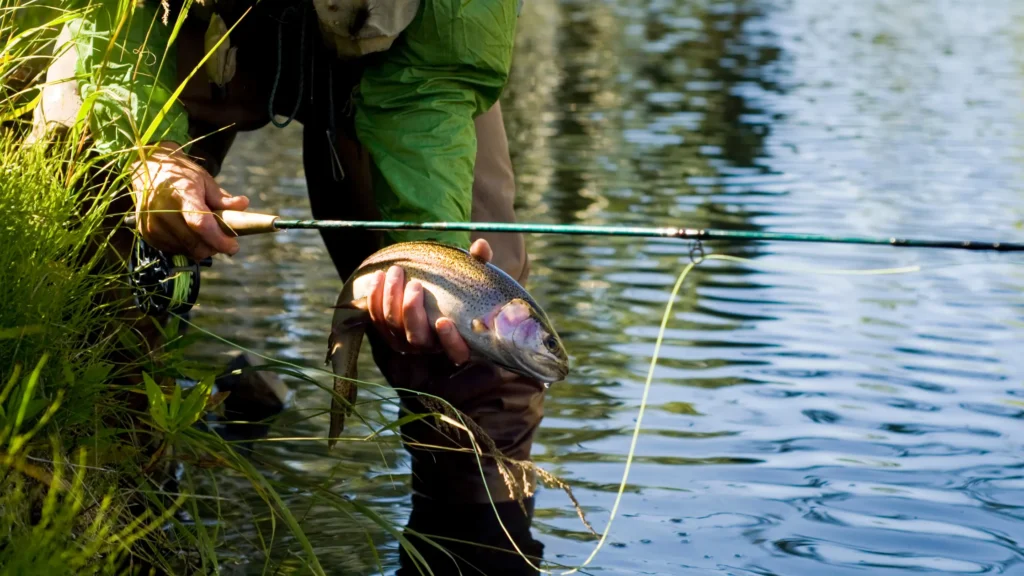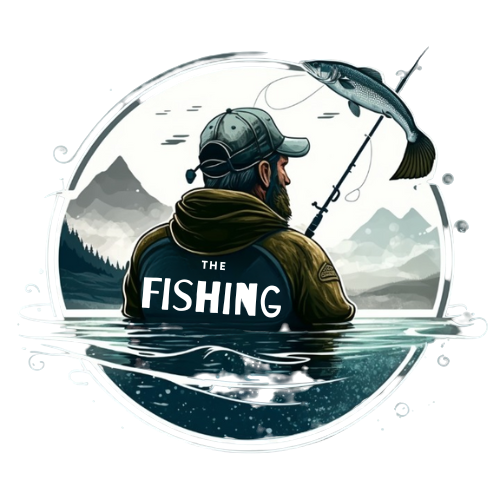Fly fishing is a popular sport that attracts anglers of all skill levels, but the question often arises – is fly fishing cruel?
In this guide, I will provide a balanced view of the topic, discussing various aspects of fly fishing.
I will also address the ethical concerns surrounding the sport, such as the pain and stress experienced by the fish, the practice of catch and release, and responsible fishing practices.
Table of Contents
Understanding Fly Fishing

Fly fishing involves using a lightweight, artificial fly as bait to catch fish. The angler casts the fly onto the water’s surface, mimicking the movement of insects and other natural prey that fish feed on.
The history of fly fishing dates back to ancient times, around 200 AD. The sport has evolved over the centuries, becoming a popular pastime for both hobbyists and professionals alike.
The main difference between fly fishing and other methods is that fly fishing relies on the weight of the line, not the lure, to cast. Anglers use a combination of skill and finesse to cast an artificial fly—made of feathers, fur, or synthetic materials—onto the water surface, imitating the movement of insects that fish feed on.
Read More: Difference between fly fishing and regular fishing
Equipment Used
- Fly rods
- Fly reels
- Specialized fly lines
- Artificial flies
- Waders and other gear for wading in water
Techniques Employed
- Casting: Presenting the fly to the fish in a natural manner
- Mending: Adjusting the fly line to control the drift of the fly
- Stripping: Retrieving the line to simulate the movement of the fly
Is Fly Fishing Cruel?
In general, fly fishing is not cruel. However, many people believe that fishing for sport is cruel because it inflicts pain every time a fish is hooked.
In order to properly address the question of whether fly fishing is cruel, we must explore various aspects of the sport, including the ethical concerns surrounding it. One area of debate is whether fly fishing is more ethical than other forms of fishing.
To explore this further, you can refer to this article on does fly fishing hurts fish.
Pain and Stress in Fish
Do Fish Feel Pain? There is an ongoing debate among scientists and researchers about whether fish feel pain.
Some studies suggest that fish have the necessary nerve receptors and brain structures to experience pain, while others argue that their responses to stimuli are purely reflexive and not indicative of pain.
Regardless of whether fish experience pain, it is clear that they undergo stress when caught. Physiological and behavioral changes occur, such as increased heart rate, elevated cortisol levels, and attempts to escape.
Comparing fly fishing to other methods, it is often argued that fly fishing causes less stress due to the quicker release of the fish and the use of lighter tackle.
If you want to know more about fish pain, read this study by the National Library of Medicine.
Compared to other fishing methods like bait fishing and trolling, fly fishing is less likely to cause severe injury to fish because of the smaller hooks and more targeted approach. However, it is not without its ethical concerns, particularly around the practice of catch and release.
Catch and Release Practice
Catch and release is a practice in which anglers release the fish they catch back into the water. The purpose of catch and release is to help maintain healthy fish populations and support conservation efforts.
Arguments for Catch and Release
- Conservation and fish population management
- Lessens the impact on fish populations
- Allows fish to continue breeding and contributing to their ecosystem
Arguments Against Catch and Release
- Potential harm and mortality of released fish
- Stress caused to fish during the process
Responsible and Ethical Fly Fishing Practices
Proper Handling Techniques
- Minimizing Fish Handling: To reduce stress and injury, handle fish as little as possible and keep them in the water while removing the hook.
- Wetting Hands Before Touching the Fish: Wetting your hands before handling fish can help protect their sensitive slime coat, which is essential for their health and disease resistance.
- Removing the hook Gently: Use needle-nose pliers or a hook removal tool to gently remove the hook, taking care not to damage the fish’s mouth or gills.
Use of Appropriate Gear
- Barbless Hooks: Using barbless hooks can significantly reduce injury to fish and make hook removal easier.
- Rubber Nets: Opt for rubber nets instead of traditional nylon or cotton nets, as they are gentler on the fish and cause less damage to their scales and slime coat.
- Landing fish Quickly: Try to land fish quickly to minimize stress and exhaustion, which can increase their chances of survival after release.
Respecting Fish Habitat and Local Regulations
- Not Disturbing Spawning Grounds: Avoid fishing in areas where fish are spawning, as this can negatively impact their reproductive success and the overall health of the ecosystem.
- Adhering to Fishing Seasons and Regulations: Follow local fishing regulations, such as size limits and catch limits, to promote sustainable fishing practices.
- Practicing Good Environmental Stewardship: Be mindful of your impact on the environment by disposing of trash properly, using biodegradable fishing gear, and respecting wildlife and their habitats.
Personal Choices and Fly Fishing
Each individual is responsible for making ethical choices when it comes to fly fishing.
By educating ourselves on ethical fishing practices, we can balance our love for the sport with respect for nature and the well-being of fish populations.
It is important to consider the potential consequences of our actions and strive to minimize harm while enjoying the outdoors.
For further reading, consider checking out these related articles:
- Is fly fishing fun?
- Is a fishing boat a good investment?
- Can you fly fish in the winter in Colorado?
- How long will it take to learn to fly fish?
- How Much Does A Fishing Boat Weigh
- How should you pass a fishing boat?
FAQs
Is fly fishing more difficult than other types of fishing?
Some aspects of fly fishing, such as casting, may be more challenging to learn initially. However, with practice and proper guidance, most anglers can become proficient in the sport.
Can I fly fish in saltwater?
Yes, fly fishing can be adapted for saltwater environments.
Saltwater flies fishing targets different species of fish, such as bonefish, tarpon, and striped bass. Specialized gear and techniques are used for saltwater fly fishing.
Conclusion
The question of whether fly fishing is cruel. No, fly fishing is not cruel in most cases.
Although, It depends on various factors, including the angler’s techniques, equipment, and practices.
While some aspects of fly fishing may cause stress or harm to fish, responsible anglers can minimize these risks by following ethical guidelines and respecting the natural environment.
